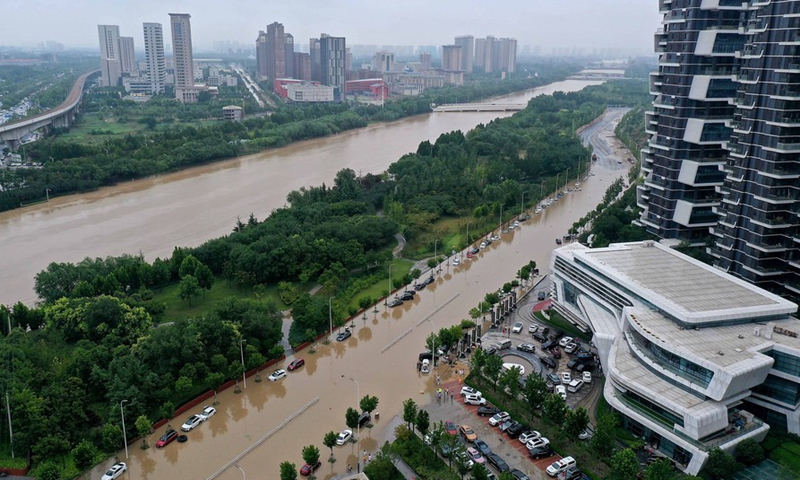
Aerial photo taken on July 21, 2021 shows submerged roads in flood-hit Zhengdong New District of Zhengzhou, central China's Henan Province.Photo:Xinhua
China's State Council announced Monday that it set up an investigation team for the July 20 floods in Zhengzhou, central China's Henan Province. This is a timely decision. According to the latest data from the Henan provincial government earlier on Monday, the death toll from the floods rose to 302, with 50 missing. Among them, 292 died and 47 are missing in Zhengzhou alone, which is very sad.
The July 20 floods are a rare extreme weather event. However, whether the government and relevant departments have fulfilled their duties is being questioned by the public, which has been waiting for an authoritative conclusion. To some extent, all extreme disasters can catch people off guard, yet that demands us to do more on preventive measures - the emergency mechanism should be activated and operated timely to minimize the number of victims.
This time, many parts of Henan were severely affected, yet the number of victims in other regions in the province was very few. This is probably because other disaster-stricken areas increased their alertness after witnessing the grave consequences of floods in Zhengzhou. The torrential rains hit the city hard first, which was a surprise test to the emergency management there.
Nevertheless, that many deaths are not a result the public would like to see. Were there omissions that could be avoided? Did some officials perform their duties poorly or even neglected or failed their duties? It is believed that the investigation team will find out and provide a credible assessment and determination on the matter.
Cities in Henan, including Zhengzhou, have made great efforts to fight the floods. In the past dozen days, numerous touching stories and a large number of heroes have emerged. The history of China, which is located in the monsoon zone, is a history of disaster resistance. The indomitable spirit of this nation is concrete manifestations of countless people in one disaster after another. So if one argues that all Zhengzhou floods have exposed is problems and all we could do is be frustrated and find those accountable, that would be not only against the reality at present, but also against the reality of history.
Drawing lessons from the past and holding relevant figures accountable are major advantages of the Chinese system. In recent years, every disaster in this country has undergone serious post-mortem investigations, and delinquent officials have been held accountable. This is an important institutional motivation for China to strengthen disaster prevention and mitigation governance.
China is a country hit by frequent floods, which requires us to be more vigilant against floods and come up with a more rigorous and effective emergency mobilization mechanism in this regard. In the past few years, the biggest problem in the northern part of the county was water shortage, and the awareness of flood prevention has generally declined. Yet Zhengzhou floods once again sounded the alarm to the entire north: We must no longer underestimate the threat of extreme weather such as floods. We must be prepared to meet all kinds of extreme disasters that have not been seen in the past. And preventing them from taking place is an indispensable basic public course for local governments.
We strongly hope that no matter how many more extreme weather will occur, the disaster-resisting effectiveness of the entire northern China will be qualitatively improved after the Henan floods, and there will be no more serious deaths. We have learned quite a lot of lessons, and we have repeatedly fallen in the pit, and gained in the wit. China needs to turn over a new leaf in terms of its comprehensive resilience toward disasters.
The State Council's investigation and holding those accountable will ensure that Zhengzhou's lessons are fully clarified and will be deeply remembered by the entire society. This is how socialist China will continue to spur itself on and achieve progress while correcting its own problems.




